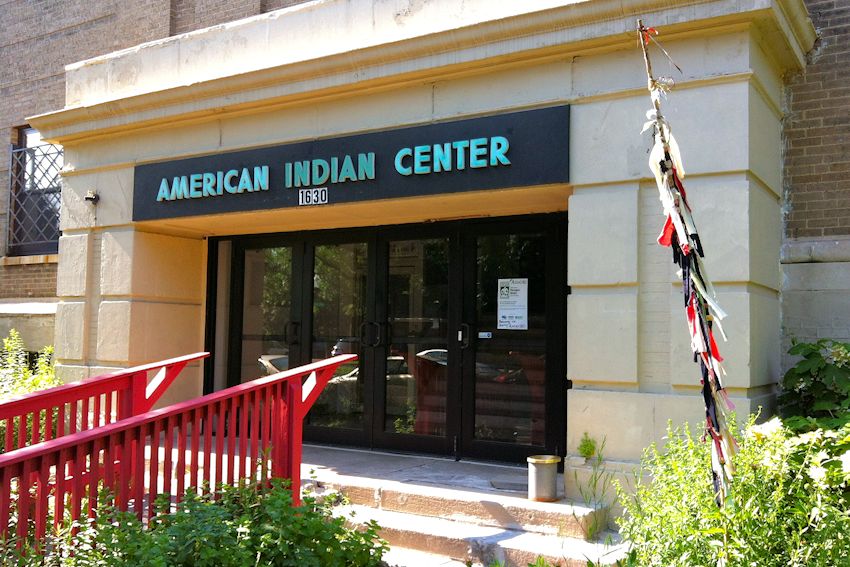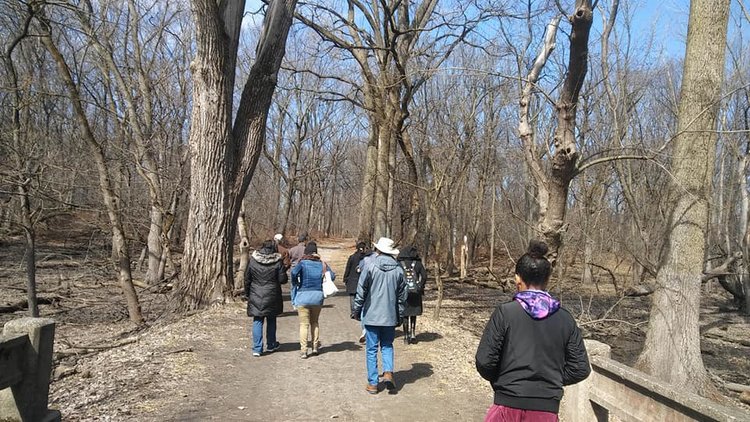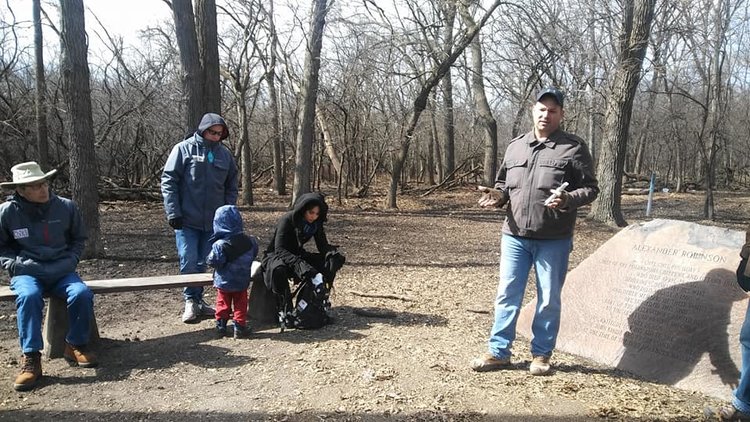
American Indian Center
The Chicago Community Trust is currently funding ten community-led riverfront projects through their Our Great Rivers grant. The Trust announced this week that the Our Great Rivers RFP is now open for a new round of funding. This piece is the first of a ten-part series highlighting the projects from the current round of funding.
Two years ago, a neighborhood on Chicago’s northwest side mobilized to prevent a cherished local canoe landing from being developed into commercial retail space. Just a year later on the same site, plans emerged to build a groundbreaking nine-mile walking museum lined with public art showcasing the history of Native Americans that once settled the Portage and Irving Park areas.
MPC Associate Chloe Gurin-Sands and Research Assistant Nicolas Robledo recently spoke with Heather Miller, the Executive Director of the American Indian Center (AIC), about the Northwest Trail Outdoor Museum (NWTOM) that is taking shape in the city’s Portage Park neighborhood. The NWTOM is a nine-and-a-half-mile outdoor “walking museum” connecting the Des Plaines River to the North Branch of the Chicago River that will teach visitors the history of the Native Americans who settled the Portage and Irving Park areas as they walk along its multiple art exhibits.

American Indian Center
The NWTOM is a product of community partnership and engagement. As a member of the Chicago Community Trust’s Our Great Rivers cohort, the AIC has formed a partnership with the Chicago Public Art Group (CPAG) and the Portage Park Neighborhood Association (PPNA) to create the NWTOM.
Santiago X, a Chicago-based architect and artist, has been selected to curate one of the art exhibits that will be placed along the trail. With the helpful input of local youth volunteers, Santiago X has been leading a collaborative effort known as SHPSHFTRS, a five-part workshop dedicated to revitalizing the creation of Indigenous earthworks and place making in urban areas and developing multiple interactive art installations along the NWTOM.
Backed with strong community input, volunteers are working on creating a mound-like structure to pay homage to the Native American mound builders of the Midwest’s past. According to Heather, the young volunteers have helped influence the decision of everything from the colors to the shape of the mound.
As seen with this youth involvement, the partnership has also been engaging the surrounding neighborhoods of Portage and Irving Parks with community meetings that encourage input on the art exhibits along the walking museum. Community engagement is a cornerstone of this project, according to Heather, and has helped guide the project in the right direction.
“When the designs for the Trail were first released, we got a lot of pushback from the community. Neighbors called to complain that they imagined a much different vision for the trail. We definitely weren’t prepared for that sudden influx of publicity” Miller said.
This initial public relations challenge, however, proved to be a blessing in disguise. The AIC, CPAG and PPNA relied on community feedback to improve the Walking Museum. According to Heather, one of the biggest challenges the AIC and its partners encountered was knowing which community organizations to partner up with. The Walking Museum is a project that transcends different neighborhoods, so finding the right local groups to work with was vital in securing enthusiastic community input from each nearby neighborhood.
“It’s been amazing working with CPAG and PPNA. I’m confident that we have a good partnership going forward with this project,” Miller said.
Though the NWTOM is not yet finished, the AIC’s Indigenous Science Days, a community program that celebrates culturally-based science, provides a glimpse into the educational experience that the trail will soon provide to the Portage Park community. This year’s first Science Day, which took place on March 17, included a nature walk tour through the Catherine Chevalier Woods and near the famed Robinson family homestead. Santiago X and youth volunteers from SHPSHFTRS participated in the tour and learned more about the impact that Alexander Robinson, a former Potawatomi Chief and prominent figure early in Chicago’s history, had on the city’s history.

American Indian Center
American Indian Center Indigenous Science Day

American Indian Center
The final vision of the Northwest Trail Walking Museum is to be a local landmark that uses the nearby Des Plaines River to bring together people of all different ethnicities and backgrounds.
“We hope to use the river as a means to connect people of all kinds of different ethnicities and cultures,” Heather said, audibly optimistic as she continued describing the vision for the Northwest Trail Outdoor Walking Museum.
“It will be a shared space that showcases the history of Native Americans in the region, and also acting as a welcoming place where people from different backgrounds can come enjoy the river and art.”
-------------------------------------------------------------------------------------------------------------------------------
The American Indian Center will be leading the next Indigenous Science Day on May 19th. See the AIC website and Indigenous Science Day Facebook page for more information.
Nicolas Robledo is a former research assistant at Metropolitan Planning Council and a current student at University of Illinois at Chicago.